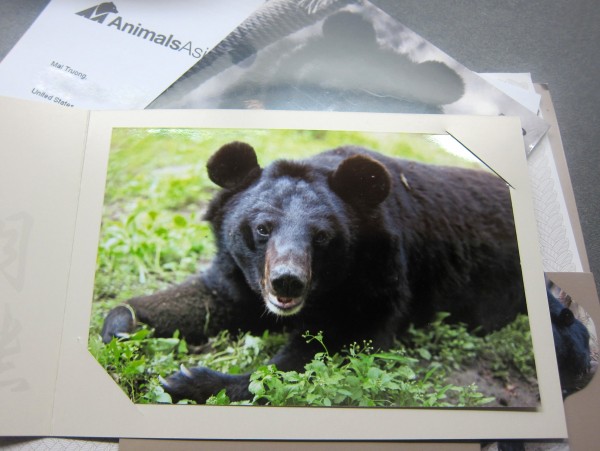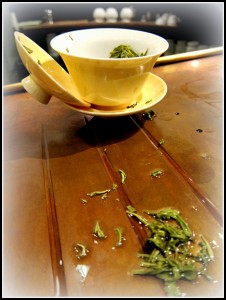
This is Wilfred. He lives in Chengdu, China. He’s an early-middle-age moon bear (not because he’s from the Moon but because like everyone in his species, he has a moon-shape patch of yellow fur on his chest). He likes watermelon and loves to climb. On paper, he’s my sponsored bear.
Wilfred is blind in both eyes, most likely a result of the poor treatment for bile-farmed bears. But at least he’s alive and now cared for in an animal shelter, something that thousands of his species can only dream of while being barred in iron cages, fed only gruel and extracted bile twice a day.
Bile farming — In Asia, there’s a belief that bear bile, a digestive juice produced from the liver and stored in the gall bladder, has medicinal effects. This belief originates from China, spreads to the neighboring countries, and results in the shameful practice of bile farming. Wild bears are hunted and kept captive in “bile farms”, where their abdomens are pierced to extract the bile from the gall bladders twice a day. Only rarely is there anesthesia, their abdomens are either stabbed repeatedly until the gall bladder is found, or the wound is kept perpetually open (not allowed to heal), which causes infection and so much pain that they would chew their own paws. The bears stay in cages designed for easy access to their abdomen, and the cages are too small for them to stand up or move around at all. They live for years in such condition until they no longer produce any bile, when they are killed for meat, fur, paws and gall bladders, or until they die from malnutrition and diseases.
Bear bile farming started in North Korea in the 1980s and spread to China, South Korea, Vietnam and most recently Laos (since 2005, when Vietnam banned bile farming). Today, bile trade is legal in China, Laos, Japan and South Korea, and illegal in Vietnam (however, due to loopholes and government negligence, bile farming still exists in Vietnam *sigh*).
Bear rescue — Organizations such as Animals Asia set out to negotiate with the governments and the farmers in these countries to rescue the bears and to provide them medical care (many bears need surgery after being rescued because of the years of damage) and food in bear sanctuaries. To date, Animals Asia has rescued a total of 400 bears. However, tens of thousands are still in bile farms, mainly in China. It’s an arduous process to convince the indifferent, money-hoarding governments and the farmers, who, for the benefit of the doubts, are presumably just trying to make a living. It’s also expensive to raise bears the humane way.
I had known about bile farming for many years, but I never looked up any information about it. As time passed, it became something like the thinning of the ozone layer – a problem that I feel so troubled by that I buried in the back of my head and avoided thinking about it altogether. Early August, my mom saw on TV that some organization was rescuing bears from Ha Long Bay (Vietnam), and she told me about it. That organization turned out to be Animals Asia. One of their programs is “sponsoring a bear,” a monthly donation program. You can sponsor a normal bear for $45, or a special care bear (one that is more severely damaged from bile farming, like Wilfred) for $55 a month.
It doesn’t take a whole lot to help — Forty five dollars was exactly how much I paid for one dinner at Belli (after my cousin took care of more than half the bill). That dinner wasn’t anything exceptional either, that’s just how much one would expect to spend on a decent meal made of good ingredients around Berkeley. In the past two years, I regularly spent this much or more per dinner, which is quite outrageous when you think about it. Even more outrageous is that rarely did those expensive meals leave me satisfied. So that just leaves a bad taste. But now, with the money I spend on one single meal, Wilfred can have enough food for a month, and I believe he enjoys his food a lot more than I enjoy mine.
Admittedly, it feels weird talking about my spending and donation. It sounds like I’m bragging about my non-existent wealth and puny generosity, and I apologize for that (._.). My intention, though, is to advertise for Animals Asia and hope to convince you to donate for the bears (._.). Animals Asia seems different from other wild life organizations – they don’t bombard us with letters, stationaries and calendars. The donated money at least doesn’t seem to be spent on advertising and “raising awareness”, but goes straight to the animals.
On my end, except for special occasions and work-related meals, you won’t see me stuffing my face at restaurants anymore [says the girl who just stuffed herself with pork shoulder last week!]. Wilfred (and his bear buddies) are holding down the fort for me. I only wish I could take a picture of them chowing.
P.S. Animals Asia’s website is not quite easily navigated at the moment [Update: Animals Asia tweeted me that they’re in the process of changing website], so here are some info links, if you’re interested in donating for the bears *wink wink nudge nudge*



Leave a Reply